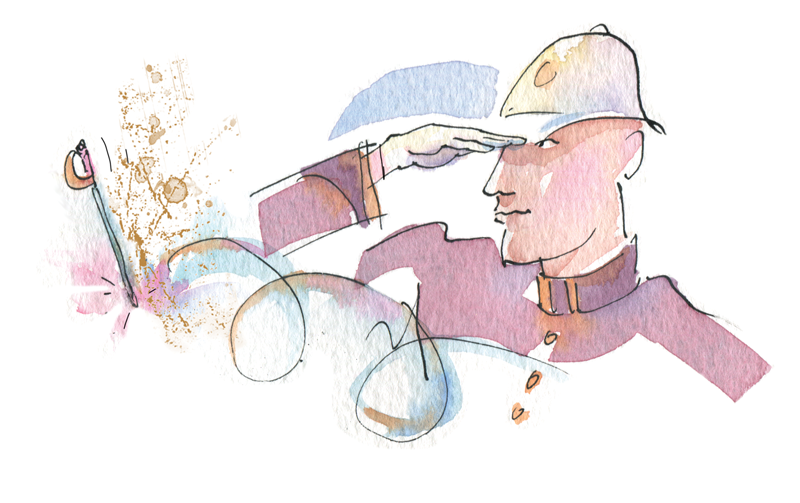
On approaching the dais at a Royal Military College of Canada parade, the officer at the head of a troop lowered his sword in salute. But as he swept the point down, he went just a bit too low. The point caught a crack in the pavement. The sword bent alarmingly, then sprang loose and bounced down the road, clanking musically as it went. The now-disarmed officer paused for a panicked instant, then snapped his hand to the brim of his cap and held that rigid salute until he was well past the reviewing stand.
A spectator later reported that the most amusing part of the incident was the reaction of the sergeant major who was watching from the sidelines. “I wondered for a moment if his eyes were going to roll right back into the head.”
Back in the days when Canada maintained an armoured presence with NATO, a troop of Canadian tanks took part in an exercise with a detachment of British engineers. The convoy included a giant bridge transporter vehicle that could span a small river with a track sturdy enough to bear a Centurion tank.
The exercise went well until the column had to go through a small village in northern Germany. The lead vehicles rolled through the streets and across the little central square without incident. The bridge transporter, however, presented a problem. It was too big—or the square too small. As it came around the corner to enter the area, there was a shattering crash. Glass and bricks clattered down on the transporter and bounced across the cobbles. The bridge had clipped an apartment building and sheared off a whole corner. On the second floor, now exposed to the world, a shocked German family—father, mother and son—sat at their breakfast table, staring at the emptiness that had moments before been their outside wall. No one said a word. Dad slowly lowered a spoon from his mouth and shook his head in disbelief.
In the aftermath, the engineers jumped to help people from their battered apartments and cleared away the worst of the rubble. The transporter backed out very gingerly. Commanding officers took the opportunity to stress, again, the importance of careful reconnaissance when planning road marches. And the Canadians heaved a sigh of relief that the culprits were British.
In 1944, the Department of National Defence produced a series of booklets detailing Canada’s involvement in the Second World War. The first publication was entitled The Canadian Army at War: The Canadians in Britain 1939-1944 and chronicled the experiences of the tens of thousands of Canadian service people stationed there.
The booklet outlined how, in the aftermath of the British evacuation of Dunkirk, Canadian units were considered a key part of British defences in the event of a German attack. Later, they spent long years training for the invasion of the continent.
A major part of the training involved road marches; the book recounts how British roads posed a serious challenge for military movements. It didn’t mince words in describing the problem:
“Before the Roman came to Rye, or out to Severn strode, the reeling English drunkard made the rolling English road.”
Not likely the sort of description you would find in a modern government publication.
Relations between the Canadians and British were generally warm, although there were some problems. The book notes how a gamekeeper on a carefully maintained estate worried constantly that the Canadian regiments stationed nearby were filled with poachers determined to snaffle his lordship’s wildlife. However, the record showed that no Canadian was ever caught poaching there.
The British-Canadian relations got warmer once Americans began to arrive in large numbers in 1942-43.
“For the last two years, the Canadians have been trying to explain Americans to the British and the British to the Americans.”
The now-disarmed officer paused for a panicked instant.
The concerns of the gamekeeper were apparently shared by British farmers. A fellow who served with a Canadian artillery regiment in Britain had a stock of stories, including the tale of how an elderly local once came to the gunner’s camp with a complaint: his flock of 36 hens was down a bird and he suspected foul (or fowl?) play.
He explained to the commander that he understood how soldiers might like a change of diet, but that he and his wife needed the income from egg sales to make ends meet.
The captain assembled his troop and read them the riot act.
The next morning, the old fellow was back again to report a miracle. When he counted his flock that morning he found he now had 38 birds.
Advertisement












